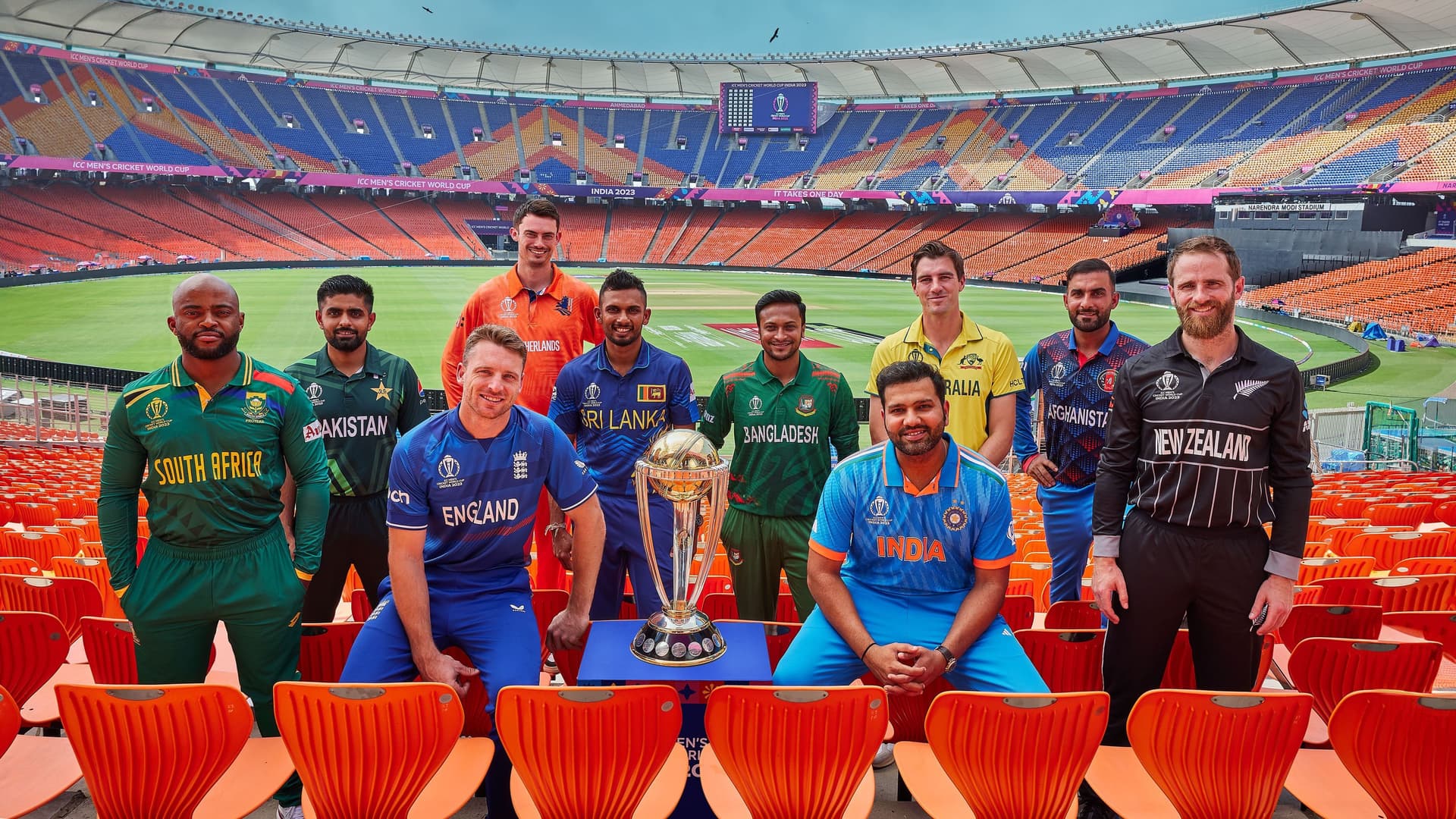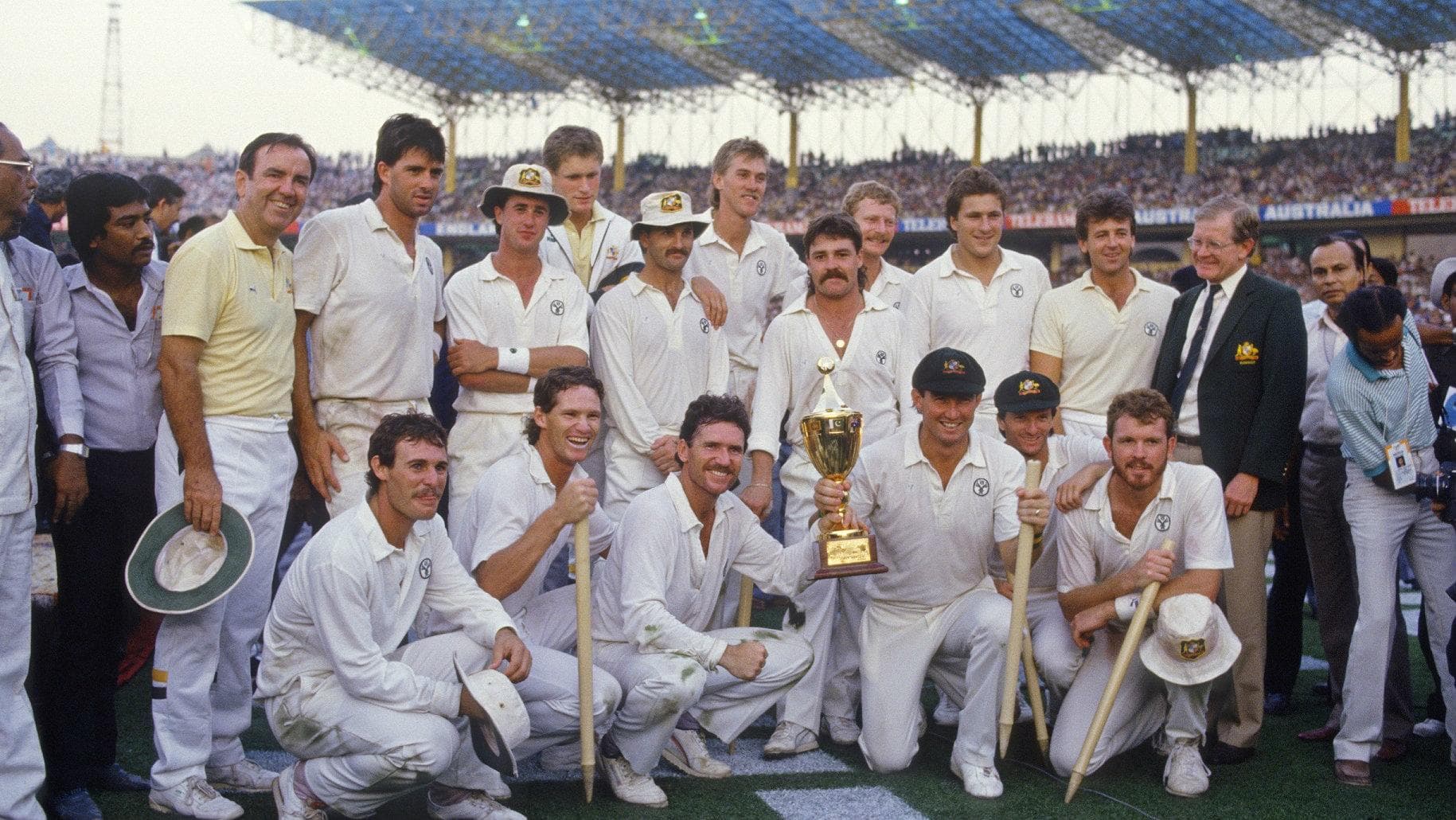Cricket
Who Are the Early Favourites for the 2023 Cricket World Cup?
After two weeks into the World Cup, India and New Zealand are two strong contenders to finish on the top. Australia and England have fallen short.

Image Credit: ICC Official Twitter (X) Account
In our pre-tournament prediction, we projected India, Australia, England, and South Africa as the top contenders to win the 2023 Men's Cricket World Cup. After three matches for each team, India, the highest-ranked ODI team, has solidified its status as the clear favourite. India remains the team to beat in this tournament. Meanwhile, the perennial dark-horse New Zealand has also remained unbeaten, showing strength in this competition.
South Africa, typically an aggressive and dominating force, suffered a significant setback with a loss to the Netherlands in Dharamsala. It was their first defeat to an associate nation in a World Cup match, but they are still among the top four contenders. Pakistan, known for their mercurial performances, has made a strong comeback, staking their claim ahead of Australia and England.
The Two Big Upsets
England Entangled in Afghanistan’s Spin Web
The Arun Jaitley Stadium in Delhi offers the most batting-friendly pitch in the World Cup 2023. South Africa scored over 400 plus runs here. Before the England vs Afghanistan match, teams batting first averaged 350, and chasing teams averaged 300. Although England limited Afghanistan to 284, they could have done even better.
England's spinners performed admirably well when bowling first, securing 5 wickets with an economy rate of 3.9. However, England's seamers struggled with their lengths, conceding 7.3 runs per over as they were punished by Afghanistan's batters. Afghanistan effectively capitalised on deliveries of both shorter and fuller lengths, while England found it challenging to score against those types of balls in the second innings.
England's batsmen faced difficulties in reading Afghanistan's spinners and exhibited hesitancy in their footwork. Their shot selection, particularly when playing against the spin, didn't yield positive results.
Netherlands Douse the Protea Fire
South Africa was caught off guard by a spirited Netherlands in Dharamsala when it came to strategy and leadership. Opting to bowl first in rain-curtailed match with cloudy skies, South Africa had the Netherlands' top order in trouble. With ten overs to go, the Netherlands were 140 for 7. However, two determined partnerships emerged: one of 64 runs off 36 balls between Roelof van der Merwe and captain Scott Edwards for the 8th wicket, and another of 41 runs off 19 balls between Aryan Dutta and Edwards. These partnerships propelled the Netherlands to 245 runs in 43 overs, adding 105 runs in the last nine overs. South Africa's bowling line-up, featuring Kagiso Rabada, Lungi Ngidi, and Marco Jansen, stuck to a similar length and line without much variation.
Netherlands effectively utilized their bowling unit, especially their spinners, to disrupt South Africa's top and middle-order batters, securing a surprising victory.
POINTS TABLE
AFTER 3 MATCHES FOR EVERY TEAM IN 2023 WORLD CUP
| TEAM | MATCHES | WON | LOST | POINTS | NRR |
|---|---|---|---|---|---|
| INDIA | 3 | 3 | 0 | 6 | 1.821 |
| NEW ZEALAND | 3 | 3 | 0 | 6 | 1.604 |
| SOUTH AFRICA | 3 | 2 | 1 | 4 | 1.385 |
| PAKISTAN | 3 | 2 | 1 | 4 | -0.137 |
| ENGLAND | 3 | 1 | 2 | 2 | -0.084 |
| AFGHANISTAN | 3 | 1 | 2 | 2 | -0.652 |
| BANGLADESH | 3 | 1 | 2 | 2 | -0.699 |
| AUSTRALIA | 3 | 1 | 2 | 2 | -0.734 |
| NETHERLANDS | 3 | 1 | 2 | 2 | -0.993 |
| SRI LANKA | 3 | 0 | 0 | 0 | -1.532 |
The Early Trends: Batting and Bowling in the Middle Overs is the Key
In the 2023 World Cup, several factors contribute to victory, but the most crucial element is the performance during the middle overs (11-40). The middle overs encompass a significant portion of the game, constituting 60% of the innings. It's the phase where the match's momentum can shift, potentially allowing the opposing team to regain control. Teams that excel during this period are the ones emerging victorious. To put things in perspective, India and New Zealand stand out with a batting average of over 100 in the middle overs, showcasing their prowess in both batting and bowling. In contrast, England maintains a middle-over average of 38.1, underscoring a marked difference in their performance.
The Middle-Over Collapses
During the early stages of this World Cup, we've witnessed several alarming middle-over collapses. Pakistan, for example, lost their last 7 wickets for a mere 36 runs in a match against India in Ahmedabad. Similarly, Sri Lanka's fortunes took a downturn when they lost their last 7 wickets for just 44 runs in a game against Australia in Lucknow. England faced their share of trouble, losing 7 wickets for 68 runs against Bangladesh, although they managed to score over 300 runs. The Dutch side encountered a similar collapse against Pakistan, losing their final 7 wickets for a mere 85 runs. Even the mighty Australia team had a downfall, shedding their last 7 wickets for only 89 runs in a match against India.
MIDDLE ORDER BATTING COLLAPSE
LOSING LAST 6+ WICKETS UNDER 100 RUNS
| TEAM | OPP | FROM | TO | RUNS ADDED | VENUE |
|---|---|---|---|---|---|
| PAKISTAN | IND | 155-3 | 191-10 | 36 | Ahmedabad |
| AFGHANISTAN | BAN | 112-3 | 156-10 | 44 | Dharamsala |
| SRI LANKA | AUS | 165-3 | 209-10 | 44 | Lucknow |
| ENGLAND | BAN | 296-3 | 364-9 | 68 | Dharamsala |
| NETHERLANDS | PAK | 120-3 | 205-10 | 85 | Hyderabad |
| AUSTRALIA | IND | 110-3 | 199-10 | 89 | Chennai |
Middle Order Batters in the Spotlight
In the ongoing World Cup, the middle phase (11-40 overs) is where the action unfolds, determining success for both batting and bowling units. A team's ability to build partnerships and maintain the scoring rate during this phase significantly impacts their chances of winning. Simultaneously, bowlers play a crucial role by taking timely wickets and containing the opposition's scoring rate during the middle overs.
New Zealand has excelled in the middle overs, with their batters averaging 140.3 runs per wicket during this phase. India follows closely with an average of 111.8, while Pakistan is at 49.5. Despite a collapse in one game against India, Pakistan's middle-order performance has been impressive, largely thanks to Mohammad Rizwan, who leads the run-scoring charts in this phase with 248 runs in 3 innings.
 (Figures in the bracket are runs scored and wickets lost for each team)
(Figures in the bracket are runs scored and wickets lost for each team)
South Africa's Aiden Markram, with 163 runs in three innings, grabbed attention when he smashed the fastest century in World Cup history. In a match where South Africa posted a massive 428/5, they scored 243 runs at a rate of 8.1 per over, losing only 2 wickets during the middle overs, allowing their batters to unleash a furious assault in the final 10 overs.
Bowling: Middle-Over Maestros Dictating the Game
While new ball bowlers set the tone at the start, it's the middle overs where a match's course can significantly shift. The bowlers must restrict the opposition's scoring rate and take key wickets to either break the back of the batting lineup or defend a total. India, New Zealand, and South Africa, the top three teams in the points table, have excelled both with bat and ball, particularly in the middle overs.
 India boasts the best economy and bowling average in this phase, taking 16 wickets in 3 games. South Africa has one more wicket but averages 29 per wicket with an economy of 5.5, having the best strike rate with a wicket falling every 31.8 balls. New Zealand, yet to unleash leg-spinner Ish Sodhi, has also taken 16 wickets but with a slightly higher economy of 5.3 and an average of 29.8.
India boasts the best economy and bowling average in this phase, taking 16 wickets in 3 games. South Africa has one more wicket but averages 29 per wicket with an economy of 5.5, having the best strike rate with a wicket falling every 31.8 balls. New Zealand, yet to unleash leg-spinner Ish Sodhi, has also taken 16 wickets but with a slightly higher economy of 5.3 and an average of 29.8.
The spin trio of Keshav Maharaj (South Africa), Mitchell Santner (New Zealand), and Adam Zampa (Australia) leads the wicket-taking charts in the middle overs with 5 wickets each. India's Kuldeep Yadav, Shakib Al Hasan (Bangladesh), Kagiso Rabada (South Africa), Rashid Khan (Afghanistan), and Hardik Pandya (India) are next, with 4 wickets each in their 3 games, placing their teams at the top of the opposition.
The middle phase of both innings has consistently proven to be the turning point in this tournament.
The Battle for Number 4 in the Points Table
As of now, India, New Zealand, and South Africa appear likely to secure the top three spots. Pakistan is a strong contender for the fourth position, with England and Australia as formidable candidates to challenge Pakistan's claim. Australia's early games saw them struggle to cross the 200-run mark against India and South Africa, but their bowling unit, led by Zampa, looks solid. With the return of the formidable trio of fast bowlers – Starc, Cummins, and Hazlewood – they managed to get their first points on the board against Sri Lanka.
England, on the other hand, must reassess their strategies, especially in dealing with spin during the middle overs. Vulnerabilities were exposed against Afghanistan when they lost seven wickets for 161 runs. Their heavy reliance on the top three batters was cleverly exploited by Afghan bowlers. In the match against Bangladesh, England lost their last 7 wickets for 68 runs. However, Dawid Malan's century, supported by half-centuries from Jonny Bairstow and Joe Root, saved the day.
In the 2023 Cricket World Cup, performance in the middle overs have emerged as the key to success for teams. The teams that ace this phase will have more stability in the tournament to absorb the shock that may arise from the top of or end of the innings.
Recommended Articles

Dillip has over two decades of experience in creating sports content. As the Sports Editor of SportsBoom, Dillip brings in a wealth of experience and expertise to the role. Dillip has worked with leading sports broadcasters and sports web content portals in Asia. He is an adept storyteller and has a special liking for data stories. He has a keen interest in data analysis and uncovering insights from large datasets. He loves to tell the story with rich and compelling data visualisation.


